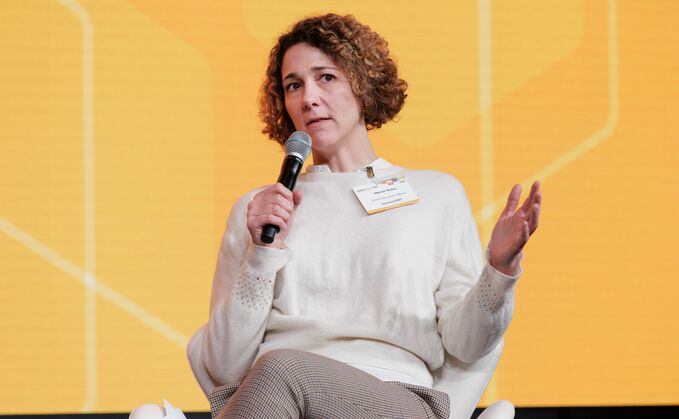
Marion Verles is CEO at SustainCERT Credit: SustainCERT
Industry Voice: We are shooting for the moon when it comes to setting ambitious climate targets and investing in new solutions, yet relying on archaic tools to make sure we are reaching them - that needs to change, argues SustainCERT CEO Marion Verles
Last week we witnessed WeWork founder Adam Neumann land $70m for a start-up to sell tokenised carbon credits on the blockchain, meanwhile discussions at Davos on how to restore trust to ‘rebuild global collaboration' lacked a focus on verification of claims.
On the one hand, news of Neumann's investment into crypto and tokenization is welcome, because we need to finance underlying projects, however solutions such as these do nothing to solve the carbon offset quality problem.
While we need new players driving innovation and digital solutions at scale, the truth is: if a carbon credit is bad quality, then it doesn't add anything to the climate whatsoever.
Neumann's project is just one of many questionable carbon credit ventures: we are witnessing hundreds of millions of dollars flowing into projects while the independent verification industry, key to ensuring projects are real and that impact invested in will lead to tangible impact on the ground, is not high enough on the agenda.
Verification is the process of ensuring a carbon project is implemented according to the standards set by global certification bodies, and when tech providers don't engage with these standards, things get messy very quickly.
For this new generation of climate players to thrive and make a tangible contribution to the climate challenge, we need to see the emergence of the next generation verification players that can digitally interface with climate tech and provide credibility that the impact being claimed is real.
The challenge is that the verification industry is perhaps the only industry that's been left untouched by the digital revolution to date. Most organizations still use manual or analogue processes to verify if projects meet the standards of certification bodies, and it goes without saying that this is expensive, complex, and is holding back action towards achieving sustainability goals under the Paris Agreement.
To solve this, at SustainCERT we are developing the world's first software platform for digital verification across carbon markets and Scope 3 reporting. Digital-monitoring reporting verification (D-MRV) will make certification standards more accessible and affordable at a scale never seen, however, it also demands rewriting the rules of the verification industry.
At Innovate 4 Climate last week, alongside carbon standards such as The Gold Standard and Verra we provided an open forum to share collaborative insights and drive consensus on best-practice for MRV in a digital context because while this industry scales up, it is essential there is consensus on how to drive more credibility, transparency and efficiency in carbon markets worldwide. We will be sharing outcomes in a whitepaper published openly in the coming weeks and look forward to feedback and engagement from the wider industry.
Speaking at the World Economic Forum meeting in Davos last week Emmanuel Faber, chair of the International Sustainability Standards Board (ISSB), underscored the role of verification in combating greenwashing stating that "the problem in today's market is that companies can make claims that nobody can verify".
What we are all dealing with is an evolving and ambiguous landscape. However, the underlying thing that everyone is trying to achieve is impact - and to ensure that the impact they invest in is actually realised.
With investments rolling into climate tech to scale solutions, it's urgent that scaling independent verification is high on the agenda too. Because essentially: if it's not verified, it's not true.
If we don't rapidly invest in innovation to meet this challenge, we may find ourselves standing on a burning planet in 20 years time, thinking: "We had all these plans, technologies, blockchains, but nothing was realised - not a single project delivered on its promise."
Marion Verles is CEO at SustainCERT.
This article is sponsored by SustainCERT.
About SustainCERT
SustainCERT is a carbon impact verification organisation developing digital verification solutions to bring credibility to climate action.
The organisation is working to disrupt the verification industry to become accessible, transparent and scalable by launching the world's first software platform to enable the digital verification of impact claims across carbon markets and value chains.
Founded as an independent standalone company in 2018 by the Gold Standard, SustainCERTs approach aligns with, and contributes to, leading international frameworks including the Sustainable Development Goals, the Greenhouse Gas Protocol.
SustainCERT is also the co-founder of the Value Change Initiative, a multi-stakeholder forum bringing together some of the world's largest companies, leading civil society actors and internationally recognised frameworks to collectively define best practice and drive down Scope 3 emissions at scale. Find out more: https://www.sustain-cert.com/
About Marion Verles
Marion is a climate and sustainable development entrepreneur who has dedicated her career to the transformation of our economic system through the redefinition of value.
Prior to co-founding SustainCERT in 2018, Marion was CEO of the Gold Standard Foundation, a leading carbon market standard where she led the launch of the Gold Standard for the Global Goals (GS4GG) as well as the Value Change Program, also co-founding the Sustainable Development Initiative and the Climate Ledger Initiative.
Prior to this, Marion spent seven years in Asia where she founded the Nexus Carbon for Development, a successful co-operative of development organizations looking to scale climate mitigation programs through results-based finance.
She is a recognised thought leader on the following topics: net zero corporate climate action, leveraging technology to drive impact at scale, the innovation and transformation of impact verification, new economy leadership and climate entrepreneurship.







